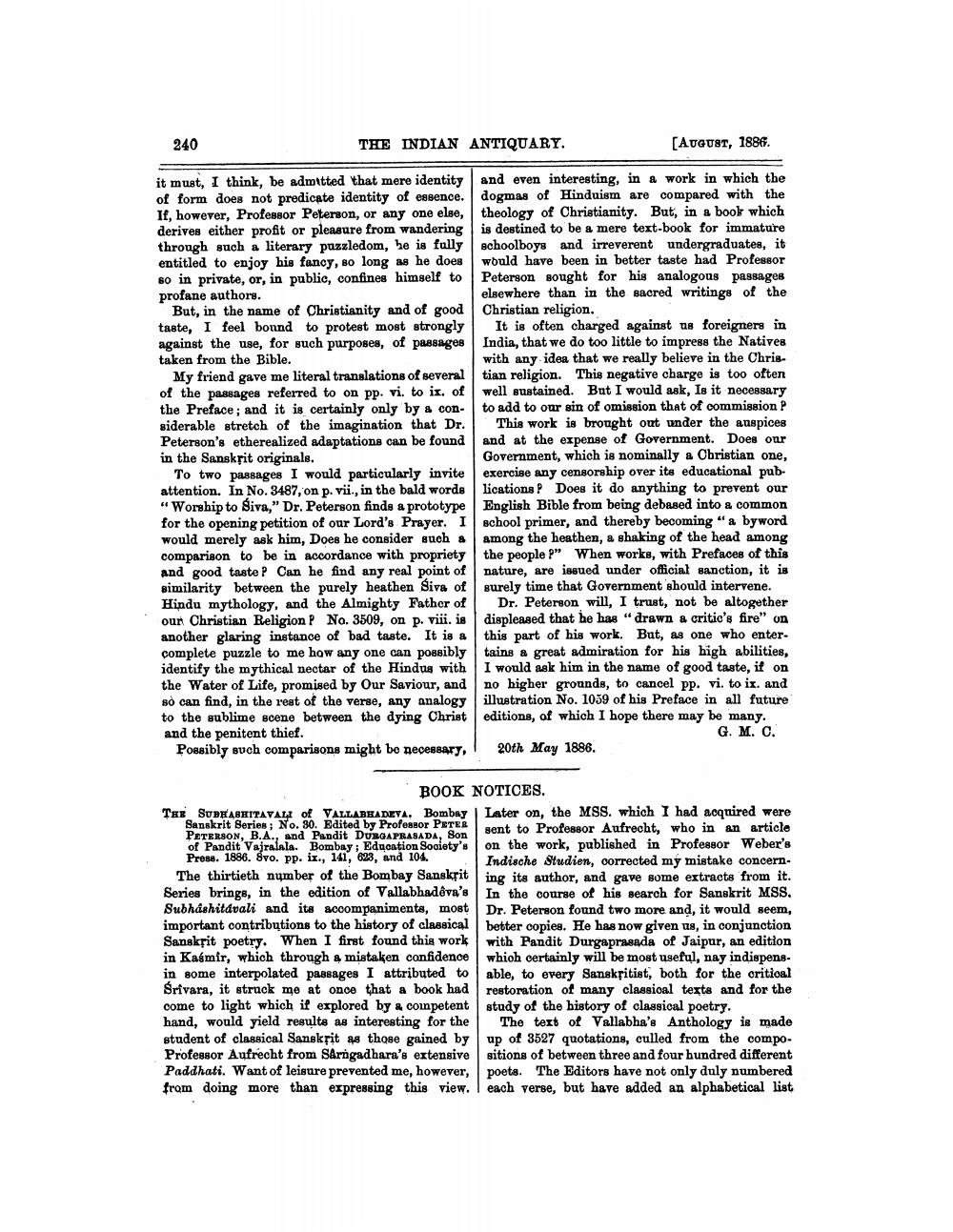________________
240
THE INDIAN ANTIQUARY.
[August, 1886.
it must, I think, be admitted that mere identity of form does not predicate identity of essence. If, however, Professor Peterson, or any one else, derives either profit or pleasure from wandering through such a literary puzzledom, he is fully entitled to enjoy his fancy, so long as he does so in private, or, in public, confines himself to profane authors.
But, in the name of Christianity and of good taste, I feel bound to protest most strongly against the use, for such purposes, of passages taken from the Bible.
My friend gave me literal translations of several of the passages referred to on pp. vi. to ir, of the Preface, and it is certainly only by & considerable stretch of the imagination that Dr. Peterson's etherealized adaptations can be found in the Sanskrit originals.
To two passages I would particularly invite attention. In No. 3487, on p. vii., in the bald words "Worship to Siva," Dr. Peterson finds a prototype for the opening petition of our Lord's Prayer. I would merely ask him, Does he consider such a comparison to be in accordance with propriety and good taste P Can he find any real point of similarity between the purely heathen Siva of Hindu mythology, and the Almighty Father of our Christian Religion P No. 3509, on p. viii. is another glaring instance of bad taste. It is a complete puzzle to me how any one can possibly identify the mythical nectar of the Hindus with the Water of Life, promised by Our Saviour, and Bò can find, in the rest of the verse, any analogy to the sublime scene between the dying Christ and the penitent thief.
Possibly such comparisons might be necessary,
and even interesting, in a work in which the dogmas of Hinduism are compared with the theology of Christianity. But, in a book which is destined to be a mere text-book for immature schoolboys and irreverent undergraduates, it would have been in better taste had Professor Peterson sought for his analogous passages elsewhere than in the sacred writings of the Christian religion.
It is often charged against us foreigners in India, that we do too little to impress the Natives with any idea that we really believe in the Christian religion. This negative charge is too often well sustained. But I would ask, Is it necessary to add to our sin of omission that of commission
This work is brought out under the auspices and at the expense of Government. Does our Government, which is nominally a Obristian one, exercise any censorship over its educational publications P Does it do anything to prevent our English Bible from being debased into a common school primer, and thereby becoming "a byword among the heathen, a shaking of the head among the people P" When works, with Prefaces of this nature, are issued under official sanction, it is surely time that Government should intervene.
Dr. Peterson will, I trust, not be altogether displeased that he has "drawn a critic's fire" on this part of his work. But, as one who enter. tains a great admiration for his high abilities, I would ask him in the name of good taste, it on no higher grounds, to cancel pp. vi. to ix. and illustration No. 1039 of his Preface in all future editions, of which I hope there may be many.
G. M. C. 20th May 1886.
BOOK NOTICES. THE SUBHABHITAVALI of VALLABEADEYA. Bombay Later on, the MSS. which I had acquired were Sanskrit Series; No. 30. Edited by Professor PETER
sent to Professor Aufrecht, who in an article PETERSON, B.A., and Pandit DURGAPRASADA, Son of Pandit Vajralala. Bombay: Education Society's l on the work, published in Professor Weber's Prese. 1886. Svo. Pp. ix., 141, 623, and 104.
Indische Studien, corrected my mistake concernThe thirtieth number of the Bombay Sanskrit ing its author, and gave some extracts from it. Series brings, in the edition of Vallabhadeva's In the course of his search for Sanskrit MSS. Subhashitdvali and its accompanimente, most | Dr. Peterson found two more and, it would seem, important contributions to the history of classical better copies. He has now given us, in conjunction Sanskrit poetry. When I first found this work with Pandit Durgaprasada of Jaipur, an edition in Kasmir, which through a mistaken confidence which certainly will be most useful, nay indispens. in some interpolated passages I attributed to able, to every Sanskritist, both for the critioal Srivara, it struck me at once that a book had restoration of many classioal texts and for the come to light which it explored by 4 competent study of the history of classical poetry. hand, would yield results as interesting for the The text of Vallabha's Anthology is made student of classical Sanskrit as those gained by up of 3527 quotations, culled from the compo. Professor Aufrecht from Sarngadhara's extensive sitions of between three and four hundred different Paddhati. Want of leisure prevented me, however, poets. The Editors have not only duly numbered from doing more than expressing this view. I each verse, but have added an alphabetical list




